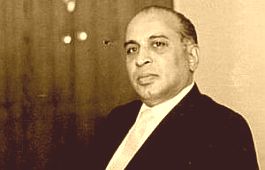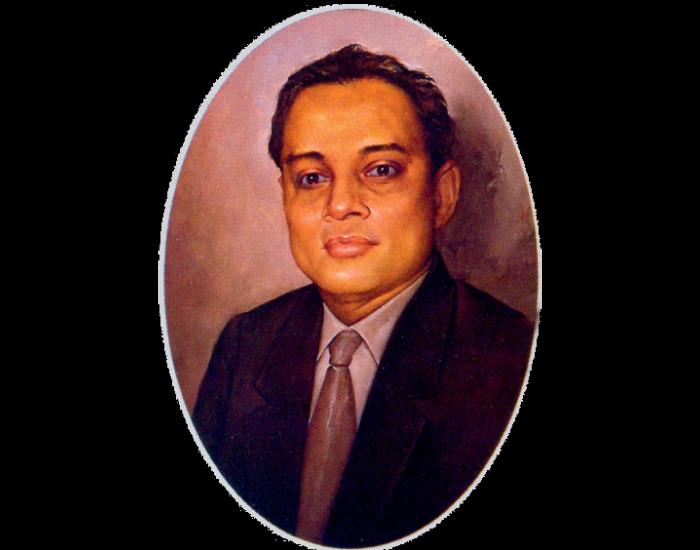Vasantrao Dempo is the face of modern Goa. No Goan, post-1961, stood so tall in the public eye and none continues to occupy so eminent a position in public memory so long after his passing. A profile on Vasantrao, the social being.
A lavish host, a gracious guest, a good friend and a trusted fellow industrialist. Plus, charming to his fingertips – that was Vasantrao
High born, handsome and well tailored he was, without doubt. The epitome of dignity, a commanding personality, certainly. But there was an aspect of Vasantrao S. Dempo that is not apparent in the words above. It was not much on display to us, his employees, in keeping with the stern demeanour of the business magnate. The fact, however, is that Vasantrao was a man of great charm. He made friends instantly. His friendships were lasting. In Goan society, on the national stage, and in the international arena equally, he was suave and urbane. A lavish host, a gracious guest and a good friend — this was Vasantrao, the social being.
The Dempo Group is understandably proud of its 50 years plus of business relations with the Nippon Steel Corporation. But this milestone rests on the foundations of the enduring friendship struck by Vasantrao with the Japanese major’s big wigs, including its one-time President, Mr. Inayama. Friendships are not initiated. They just happen. It takes a spark of charm, that is all. The Dempo – Nippon story happened this way.
Mineral ore is not the only area in which Vasantrao made his mark. Another field highly relevant to Dempo is seagoing. Here, too, it was Vasantrao ‘s gift for winning friends and influencing people that added value to his entrepreneurship. Alfred Krupp, head of the German conglomerate, Krupp’s, agreed to let Vasantrao have a ten- year credit on two bulk carriers of 36,000 tonnes dwt. each being built by them at Bremen Shipyard, in the years following World War Two. The deal was worth 44 million marks. None of this explains the extraordinary terms on which this deal was struck. What does explain it is the Vasantrao charisma.
Even within the Goa, Vasantrao fostered abiding friendships,either with those in family relation with him, or mineral ore processors, or men of business and in profession. Names such as Malbarrao Sardessai, Madhavrao Talaulikar, Santu Bharne, Rui Gomes Pereira come to mind — a convivial group of achievers, intellectuals, and creative personalities. If man is known by the company he keeps, Vasantrao was, simply, great.
Vasantrao was not given to excessive friendliness. He maintained his reserve with poise. With Khushwant Singh, he was dignified in face of his questioning about his wealth and power. Singh ended up writing an interesting, readable interview with Vasantrao, published in the volume commemorating the latter’s sixtieth birthday. He admits to being impressed by the man who started by being guarded, but relaxed as minutes passed.
Vasantrao in his lifetime would recall with pleasure a social conquest he made in his youth. The story illustrates, as nothing else does, his irresistible charm. Irritated by the bragging of a fellow guest, an Indian in a Paris hotel, at the exorbitant price he had paid for a package of perfumes from the famed House of Dior, Vasantrao challenged him to a bet, maintaining that he would return with a similar package free. He sought a meeting with the legendary old Madame Dior, and placed a bulk order for scents. Charmed by his gallantry, Madame presented him with an advance package of perfumes, insisting upon making a gift of it, despite Vasantrao’s courteous offer to pay!
As host, there was none to outdo Vasantrao. The high and the mighty, wherever from, would make it a point to call at Dempo Villa, where the highest standards of hospitality were set. The only private citizen to play host to Dr. Mario Soares, President of the Republic of Portugal on his state visit to India was… you guessed it!
While on Portugal, it is noteworthy how the aura of aristocracy clung to Vasantrao and made itself felt.. At the residence of the Portuguese president in 1958, the latter was presented as “Barao Dempo”. It is tempting to surmise that this faux pas owed much to the sheer force of his personality.
Indeed, the patrician qualities in the persona of Vasantrao marked him out in the crowd. He was a man of the people, but seemed special. One is left groping for words to define that quality which made him so compelling. In the end, one has to conclude that he was among us equals a man more equal than us.




